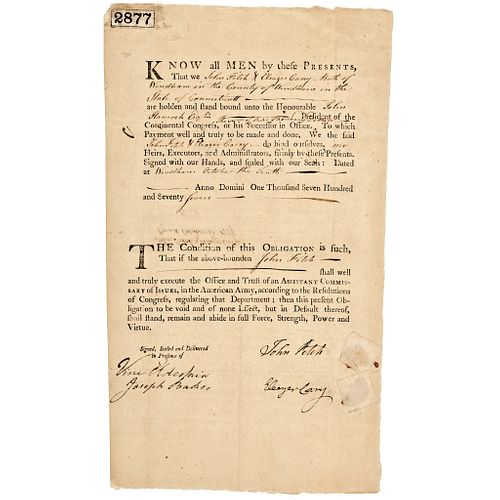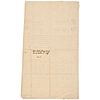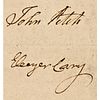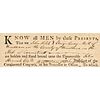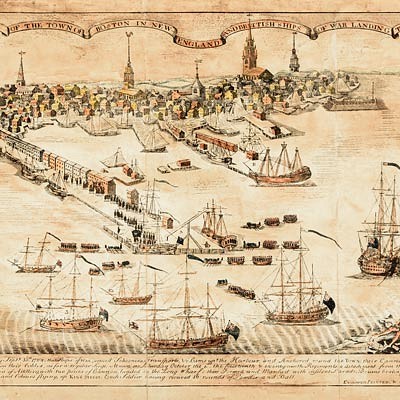1777 JOHN FITCH Signed Revolutionary War Document Inventor 1st Steamship Patent!
Lot 28
About Seller
Early American History Auctions
1520 Commerce St., #312
Winchester, VA 22601
United States
Categories
Estimate:
$12,000 - $24,000
Absentee vs Live bid
Two ways to bid:
- Leave a max absentee bid and the platform will bid on your behalf up to your maximum bid during the live auction.
- Bid live during the auction and your bids will be submitted real-time to the auctioneer.
Bid Increments
| Price | Bid Increment |
|---|---|
| $0 | $10 |
| $200 | $20 |
| $300 | $25 |
| $500 | $50 |
| $1,000 | $100 |
| $2,000 | $200 |
| $3,000 | $250 |
| $5,000 | $500 |
| $10,000 | $1,000 |
| $20,000 | $2,000 |
| $30,000 | $2,500 |
| $50,000 | $5,000 |
| $100,000 | $10,000 |
| $200,000 | $20,000 |
| $300,000 | $25,000 |
| $500,000 | $50,000 |
About Auction
By Early American History Auctions
Mar 20, 2021
Set Reminder
2021-03-20 12:00:00
2021-03-20 12:00:00
America/New_York
Bidsquare
Bidsquare : Autographs-Colonial-Political-Americana
https://www.bidsquare.com/auctions/early-american-history-auctions/autographs-colonial-political-americana-6509
330 Lots of Rare, Historic Autographs, Americana, Civil War Era, George Washington, Abraham Lincoln, Slavery & Black History, Revolutionary War Era, Colonial America, Federal Period, War of 1812, Colonial Currency, Indian Peace Medals & more... Early American History Auctions auctions@earlyamerican.com
330 Lots of Rare, Historic Autographs, Americana, Civil War Era, George Washington, Abraham Lincoln, Slavery & Black History, Revolutionary War Era, Colonial America, Federal Period, War of 1812, Colonial Currency, Indian Peace Medals & more... Early American History Auctions auctions@earlyamerican.com
- Lot Description
Autographs
"John Fitch" Signed Document Granted First U.S. Patent For The Steamboat "...bound unto the Honourable John Hancock Esqr. President of the Continental Congress..."
JOHN FITCH (1743-1798). Famous Inventor, who on August 22, 1787, demonstrated the First Successful Steamboat, launching a 45-foot craft on the Delaware River in the presence of Delegates from the Constitutional Convention, and was Granted the First Official Patent in 1791 for a Steam Powered Ship in the United States.
October 10, 1777-Dated Revolutionary War Period, Partly-Printed Document Signed, "John Fitch" and "Eleazer Carey" at Windham, State of Connecticut, Choice Very Fine. John Fitch's Official Continental Congress appointment form issued for John Hancock, President, appointing John Fitch as "ASSISTANT COMMISSARY of ISSUES, in the American Army." It measures 12" x 7" with its two .75" round wax and paper Seals intact, completed in dark brown ink on fine quality laid period paper. There is an old collection number paper tag in the upper right corner which appears easily removable. This Exceedingly Rare Official Document for the American Army being the first we have seen and offered. This historic "John Fitch" Signed Document reads, in full:
"Know all MEN by these PRESENTS, That we John Fitch and Eleazer Carey -- Both of Windham in the County of Windham in the State of Connecticut -- are holden and stand bound unto the Honourable John Hancock Esqr. President of the Continental Congress, or his Successor in Office, The sum of five thousand Dollars --To which Payment well and truly to be made and done, We the said John Fitch & Eleazer Carey do bind ourselves, our Heirs, Executors, and Administrators, firmly by these Presents. Signed with our Hand, and sealed with our Seals: Dated at Windham October the Tenth - Anno Domini One Thousand Seven Hundred and Seventy seven - -
The Condition of this OBLIGATION is such, That if the above-bounden John Fitch - shall well and truly execute the Office and Trust of an ASSISTANT COMMISSARY of ISSUES, in the American Army, according to the Resolutions of Congress, regulating that Department; then this present Obligation to be void and of none Effect, but in Default thereof, shall stand, remain and abide in full Force, Strength, Power and Virtue"
Signed at lower right "John Fitch" and "Eleazer Carey" each with a small wax and paper seal. At lower left, "Signed, Sealed and Delivered in Presence of 'Vinc Eldermin' and 'Joseph Baker.'" Reverse side Docket reads: "John Fitch & Eleazer Carey's Bond October 10, 1777"
Countersigned by the witnesses Vinc Eldermin and Joseph Baker. Usual light folds, even in tone and overall very nice looking having no separations or repairs. An exceptional, exceedingly rare and highly unusual historic Revolutionary War Document, mentioning being "...bound unto John Hancock, President of the Continental Congress". John Fitch served briefly during the American Revolution, mostly as a gunsmith, working for the New Jersey militia. He left his unit after a dispute over a promotion, yet continued his work repairing and refitting arms in Trenton. In the Fall of 1777, John Fitch provided beer and tobacco to the Continental Army in Philadelphia. During the following Winter and Spring, he provided beer, rum and other supplies to George Washington's Continental Army troops at Valley Forge. John Fitch was Granted a Patent on August 26, 1791, after a battle with James Rumsey, who had created a similar invention. Fitch's Steamboat invention idea would be turned profitable by Robert Fulton, decades later. An extraordinary document, pleasing for display and the first of this type we have offered.
John Fitch (1743-1798) was born to Joseph Fitch and Sarah Shaler in Windsor, Connecticut, on January 21, 1743, on a farm that is part of present-day South Windsor, Connecticut. He received little formal schooling and eventually apprenticed himself to a clockmaker. During his apprenticeship, Fitch was not allowed to learn or even observe watchmaking (he later taught himself how to repair clocks and watches).
He married Lucy Roberts December 29, 1767. Following this apprenticeship in Hartford, he opened an unsuccessful brass foundry in East Windsor, Connecticut, and then a brass and silversmith business in Trenton, New Jersey, which succeeded for eight years but was destroyed by British troops during the American Revolutionary War.
John Fitch served briefly during the American Revolution, mostly as a gunsmith, working for the New Jersey militia. He left his unit after a dispute over a promotion, yet continued his work repairing and refitting arms in Trenton. In the Fall of 1777, John Fitch provided beer and tobacco to the Continental Army in Philadelphia. During the following Winter and Spring, he provided beer, rum and other supplies to George Washington's Continental Army troops at Valley Forge.
In 1780, he began work as a surveyor in Kentucky where he recorded a land claim of 1,600 acres (6.5 km2) for himself. In the spring of 1782, while surveying in the Northwest Territory, he was captured by Indians and turned over to the British, who eventually released him.
On August 26, 1791, John Fitch was Granted a United States Patent for the Steamboat. Four years earlier, on August 22, 1787, John Fitch had demonstrated the First Successful Steamboat, launching a forty-five-foot craft on the Delaware River in the presence of delegates from the Constitutional Convention.
John Fitch (1743-1798) built the First recorded Steam Powered Ship in the United States, in 1786. The first successful trial run of his steamboat was made on the Delaware River on August 22, 1787, in the presence of Delegates from the Constitutional Convention.
John Fitch was Granted a Patent on August 26, 1791, after a battle with James Rumsey, who had created a similar invention. Fitch's idea would be turned profitable by Robert Fulton, decades later. In the autumn of 1777, Fitch sold beer and tobacco to the British, an act that caused General George Washington to greatly despised him for his facilitating the British.
Our Auction Contents:
Black History & Slavery: (Lots 1 - 63)
Abraham Lincoln Related: (Lots 64 - 74)
Historic Autographs: (Lots 75 - 235)
Colonial America: (Lots 236 - 261)
Revolutionary War: (Lots 262 - 304)
George Washington Related: (Lots 305 - 306)
Early American Guns & Weapons: (Lots 307 - 318) - Shipping Info
-
Early American provides in-house worldwide shipping. Please contact us directly if you have questions about your specific shipping requirements.
-
- Buyer's Premium



 EUR
EUR CAD
CAD AUD
AUD GBP
GBP MXN
MXN HKD
HKD CNY
CNY MYR
MYR SEK
SEK SGD
SGD CHF
CHF THB
THB